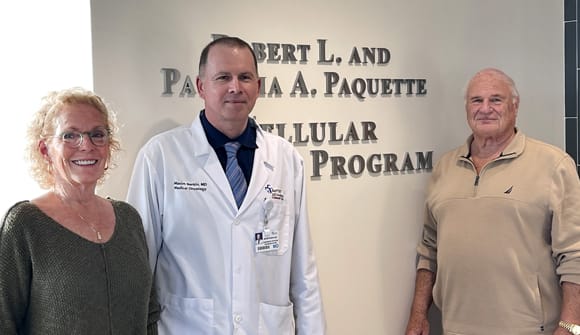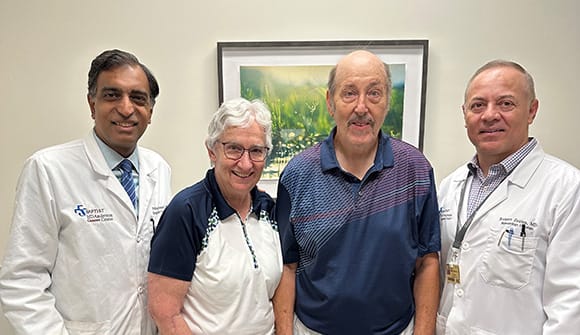What’s in your DNA?
Genetic testing increases chances of survival.
Article Date:

DNA or genetic testing has become increasingly popular in people determining their ancestry or other traits.
But did you know such testing is essential in helping treat certain types of cancers, especially ovarian and breast cancer?
What’s in your DNA, not only can help those close to you but also yourself.
What lies in a person’s genetic makeup, can help doctors know how to proceed in treatment and how to prevent associated cancers from occurring in the future.
But one recent study found that despite the importance of genetic testing, there has been a decrease in the number of people with ovarian and breast cancer getting tested.
Studies show the benefit of genetic testing
A study funded by the National Cancer Institute that looked at cancer registries in 2013 and 2014 found only about one-quarter of the women with breast cancer and one-third with ovarian cancer underwent genetic testing. The study looked at more than 83,000 women in California and Georgia diagnosed with breast cancer and ovarian cancer.
The findings, published in April 2019 in the Journal of Clinical Oncology, also found that 15 % of the ovarian cancer patients and 8% of breast cancer patients who did receive genetic testing were found to have inherited gene mutations which warranted changes in their treatment plan.
Jenny Whitworth, MD, a gynecologic oncologist with Baptist MD Anderson Cancer Center, said results of studies in the past year have physicians stressing the importance of genetic testing, which involves a blood test or cheek swab.
The benefits include:
- Knowing how to proceed with the right treatment. Some medications are geared toward cancers with gene mutations.
- Preventing future cancers. A person with a gene mutation for breast cancer is at higher risk for ovarian cancer and a person with ovarian cancer is at higher risk for breast cancer. Screenings and other steps such as surgery can be taken.
- Allowing a child whose parent carries the gene to take preventive action such as surgery, which significantly reduces their risk. First-degree relatives, male or female, have a 50% chance of having the same mutation.
“We have really good evidence that knowing this information could impact your life,” Dr. Whitworth said. “You can be proactive about your health especially people with early ovarian stage cancer. You have a chance to intervene in preventing breast cancer.”
Dr. Whitworth said sometimes people don’t get tested because they don’t have children and don’t realize that it’s still important to their treatment and future care. And, if they do have children, they delay testing because they may feel a sense of guilt of passing on the gene mutation.
Knowing the answer is essential
Another national study last fall found that patients testing positive for the gene mutation, BRCA1 and BRCA2, benefit from new medication known as PARP inhibitors after surgery and chemotherapy. Based on the study, Dr. Whitworth said 70 percent of women are still in remission three years later compared to 25% without the medication.
“The secret is trying to keep patients in remission. These PARP inhibitors are a huge breakthrough for us,” Dr. Whitworth said. “Ovarian cancer is very aggressive and tends to reoccur in 80% of women. We can really change your outcome if we know you are BRCA positive and we start you on this medication.”
About 15% of ovarian cancers are caused by inherited mutations. All women diagnosed with ovarian cancer are recommended to receive genetic testing. For breast cancer, the recommendations are based on several factors including family history and age at the time of cancer diagnosis.
All women diagnosed with ovarian cancer are recommended to receive genetic testing. For breast cancer, the recommendations are based on several factors including family history and age at the time of cancer diagnosis.
Risk increases with age
About 22,530 women this year will be diagnosed with ovarian cancer, according to the American Cancer Society. While rare, ovarian cancer ranks fifth in cancer deaths among women. A woman’s risk of being diagnosed with ovarian cancer during her lifetime is about one in 78.
Ovarian cancer generally occurs in older women with about half of those diagnosed being 63 years or older. While there are some vague symptoms such as bloating, constipation, decreased appetite and pelvic pain, most cases are advanced when diagnosed.
About 80% of people diagnosed are Stage III requiring removal of not just the ovaries, but part of the intestines and in some cases part of the spleen, liver and bladder, Dr. Whitworth said. She suggests if someone is having these symptoms every day for two weeks without change to see a physician for an ultrasound and evaluation.
Baptist MD Anderson offers genetic counseling services to help assess patients and their family members for inherited cancer syndromes or cancer predisposition.



